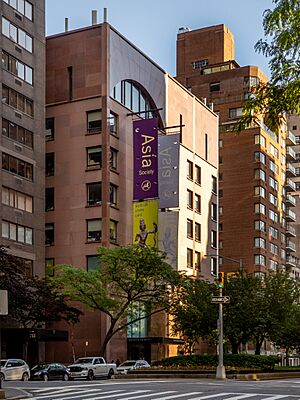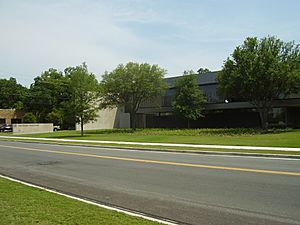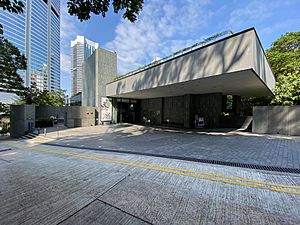Asia Society facts for kids
 |
|

Asia Society's Manhattan headquarters and museum designed by Edward Larrabee Barnes and John MY Lee Architects
|
|
| Established | 1956 |
|---|---|
| Type | 501(c)(3) organization |
| Headquarters | 725 Park Avenue New York City 10021 U.S. |
|
President
|
Kang Kyung-wha |
|
Revenue
|
$31 million USD (2019) |
The Asia Society is a group that teaches people around the world about Asia. It has many centers in the United States, including New York City, Washington, D.C., Houston, Los Angeles, San Francisco, and Seattle. It also has centers in other countries like Hong Kong, Manila, Seoul, Melbourne, Sydney, Tokyo, Mumbai, Delhi, Paris, and Zurich.
The main office of the Asia Society is in New York City. This building also has a museum. The museum shows art from Asia, Oceania, and from Asian people living in other parts of the world. The Asia Society also publishes an online magazine called ChinaFile.
In January 2024, Kang Kyung-wha became the new president and CEO. She was the first female Minister of Foreign Affairs of South Korea from 2017 to 2021. The Asia Society is known for helping with quiet talks between different countries.
Contents
History of the Asia Society
The Asia Society was started in 1956 by John D. Rockefeller III, a well-known person. In 1974, Rockefeller gave 300 pieces of Asian art to the Asia Society. These artworks were worth a lot of money.
At first, the Asia Society focused on helping Americans understand Asia better. It was seen as a New York organization with smaller offices in other places. Around 2011, the group started to focus more on working together with people in Asia. They also wanted to connect Asians and Americans in business, culture, education, and public policy.
In 2011, the Asia Society began to become a more international organization. They built two large centers in Houston and Hong Kong. Before this, they only had small offices there. The old records of the organization are kept at the Rockefeller Archive Center in North Tarrytown, New York.
Buildings of the Asia Society
New York Headquarters
The Asia Society's main building in Manhattan is on Park Avenue and East 70th Street. It is a nine-story building made of smooth red granite from Oklahoma. It was designed by Edward Larrabee Barnes and John M.Y. Lee Architects in 1980.
The building replaced some old brownstone houses on a very fancy street. Barnes designed it to look strong and fit in with the other buildings. He also set it back from East 70th Street. This created a garden with terraces between the street and the older houses. The round window at the top and the different colors of the granite are meant to remind people of Asian cultures.
In 1999, the headquarters closed for 18 months for a big update. New inside spaces were designed by Bartholomew Voorsanger. During this time, the society used a temporary office on 59th Street. The updated building included a 24-foot-high atrium (a large open space) and a cafe. The museum's exhibition space doubled in size. This allowed the society to show special exhibits in addition to the Rockefeller Asian art collection.
Many people know the Asia Society for its beautiful headquarters and art galleries.
Global Centers
Asia Society Hong Kong Center
In 2012, the Asia Society grew a lot. New, very expensive buildings opened in Hong Kong and Houston, Texas. The Hong Kong complex opened on February 9, 2012. It is built on the site of an old British military explosives storage area. It looks out over Victoria Harbour. The complex includes many old military buildings that were fixed up. Architects Tod Williams and Billie Tsien designed this project. The Asia Society Hong Kong Center was first started in 1990.
Asia Society Texas Center in Houston

The Texas Center first opened in 1979. The current building is 40,000 square feet. It is located in Houston's museum district. This building opened on May 6, 2012. It was designed by architect Yoshio Taniguchi. The Texas Center cost $50 million to build. It has a modern style and is made with limestone from the Jura Mountains in Germany. The building also has glass walls, steam coming from the roof, and a garden. These are all important parts of its design.
New York Museum
The Asia Society Museum is located at its 70th Street headquarters. It hosts traditional, modern, and current art shows. It also has film screenings, book events, and performances. The museum's collection includes art from as far back as 1100 BCE to the 1800s CE. It has Chinese pottery from the Song and Ming periods. It also shows works by modern Asian artists and artists of Asian heritage living in other countries.
The museum's collection of old objects came from a gift. Asia Society founder John D. Rockefeller 3rd and Blanchette Ferry Hooker Rockefeller gave many items in 1978. The society started collecting modern Asian art in 2007. A major update was finished in 2001. This doubled the size of the four public galleries. It also added more space for educational programs, meeting rooms, and an auditorium.
The headquarters also has a museum shop and a cafe. The Garden Court Cafe (now called the Leo Café) has been listed as one of New York's best eateries many times.
Leadership
In January 2024, Kang Kyung-wha was named the new president and CEO. She officially started in April 2024.
Board Co-Chairs
- Chan Heng Chee
- John L. Thornton
Past Presidents
- Phillips Talbot (1970–1982)
- Robert Oxnam (1982–1992)
- Vishakha N. Desai (2004–2012)
- Josette Sheeran (2013–2021)
- Kevin Rudd (2021–2023)
What the Asia Society Does
Business Programs
From 1998 to 2010, the Asia Society held a Corporate Conference in Asia every year. This event helped raise money. It also looked at how big economic changes and world events affected Asia and the rest of the world. Leaders from Asian governments often spoke at these conferences. There were also discussions with business and policy leaders from around the globe.
Education Programs
The Asia Society's Education department has two main goals. One goal is to teach people in the United States about Asia. The other goal is to help schools in the U.S. invest more in learning about other countries.
International education means knowing about other parts of the world, different cultures, and global issues. It also means being able to speak other languages and work with people from different backgrounds. It teaches values like respecting and caring for other cultures and people.
Policy Work
The Asia Society has two groups that focus on policy. The Asia Society Policy Institute (ASPI) was started in 2014. It is a "think tank" that works with leaders and experts in Asia.
The Center on U.S.-China Relations was created in 2006. It aims to build a better relationship between the United States and China. The Center works on projects and events that explore shared interests and different views between the two countries. It focuses on topics like policy, culture, business, media, economics, energy, and the environment. Orville Schell is the current director of this center.
Partnerships
In May 2020, during the COVID-19 pandemic, the Asia Society worked with other groups. They partnered with the East Coast Coalition for Tolerance and Non-Discrimination and the Rockefeller Foundation. Together, they held an online meeting called Standing Against Racism in the Time of COVID. Speakers at this event included Representative Ted Lieu, then-Los Angeles Mayor Eric Garcetti, community organizer Bincheng Mao, and actor Tzi Ma. The Asia Society also works closely with the Chinese People's Association for Friendship with Foreign Associations.
See also
 In Spanish: Asia Society para niños
In Spanish: Asia Society para niños
- Japan Society (Manhattan)
- The Korea Society
 | Georgia Louise Harris Brown |
 | Julian Abele |
 | Norma Merrick Sklarek |
 | William Sidney Pittman |



